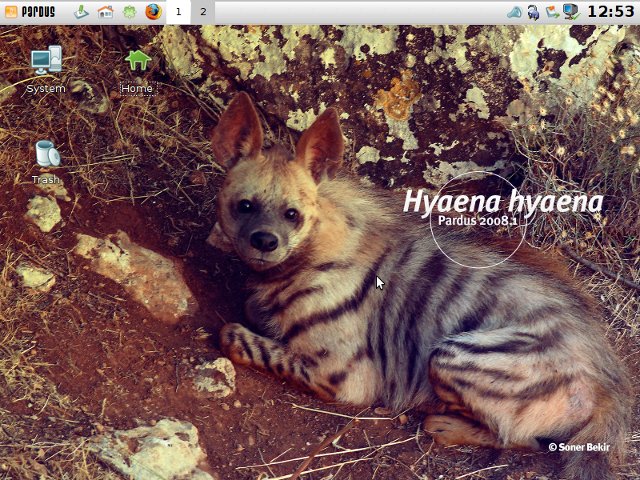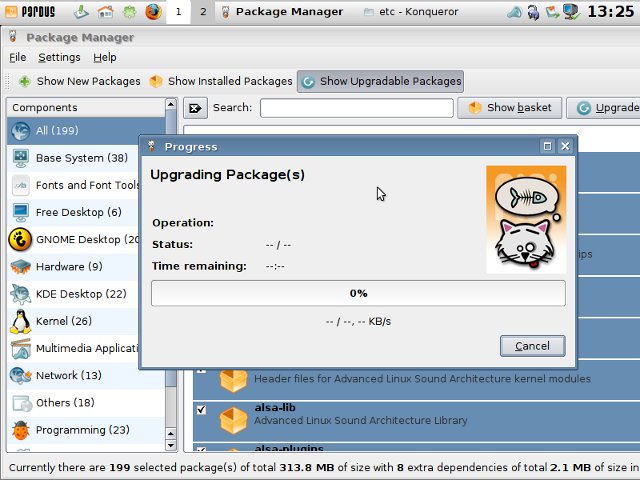Pardus 2008.1
Turkey is not only the sea, the heat, the palm trees and the vile local tequila. There is a State (of course, Turkish) Institute of Electronics and Cryptology (UEKAE), which is developing its own Linux distribution. I became interested and decided to take a closer look at it. I dare to assure you there is something to look at.
Installation - YALI
This is a graphical installation program. All yellowish and pretty. Everything is simple even for the first time seeing Linux, as if Ubuntu is being installed. It offers to create users and create a root password before copying packages. During the installation, it advertises the own development of the Turks, included in Pardus, as well as some other packages included in the distribution, like Kopete, GIMP or Firefox. Unlike the installers I’m used to, it first copies all the necessary packages with a pack to the hard drive, and then it also sets up everything in turn.

YALI
First of all, after rebooting, you will be greeted by the Basic System Setup Wizard - Desktop Kaptan. You can quickly customize the look, the network, add repositories, and so on - that is, everything that usually ends the basic system setup for most users. More fine-tuning of the entire system can be done through Tasma - the local Control Center for All. Unfortunately, the Russian language is absent by default, although it is when choosing a language during installation (but it can be installed separately).
')

Kaptan Desktop

Pardus 2008.1 Hyaena Hyaena with hyena hyena on the Volpaper
The network is configured and managed through NetworkManager. This is not the one in Ubuntu and Fedora, but your own Pardus. In addition, the Firewall is also present here - the firewall is also a local Turkish spill. I did not set out to test the performance of network applications in extreme conditions, but in ordinary everything works, as I was convinced, with a bang.
The package manager is called PiSi (Turkish “KiSa”). To it there is a gui-client with the same licked interface and the so-called “basket” - a list of packages to be updated, deleted or installed, which can be viewed and edited separately. You can also work with PiSi through the console, and with a completely human language, like pisi install package-name or pisi emerge package-name .

Package Manager, PiSi. Oh shit, the whole screen didn't fit
While the kitty is downloading updates from Turkey, I climbed on a tour of the / etc folder. Firstly, in the / etc / network folder there is some kind of garbage, apparently, this is due to the fact that all network connections are edited via NetworkManager, and no interfaces to you :) In addition, there is a folder / etc / modprobe. As far as I know, modprobe is used to add or remove kernel modules (unless the Turks named some of their other offspring in the same way), so one can hope that the kernel is modular or some kind of hybrid. Next to modprobe is the folder / etc / mudur - this is a local analogue of the upstart system, accelerating the OS load. As written on the site itself www.pardus.org.tr , mudur was written specifically for pardus, and is not ready for use in other distributions, since it requires something specific to the core for it.
By the way, everything worked out and the Russian language was installed through the tasma.

In addition to all of the above, Pardus includes several more unique Turkish inventions. COMAR, for example, is true what it is, I did not really understand, the User Manager of his own spill, and a certain Zemberek, who, working as a demon, checks that the correctness of the Turkish words is written.
What can I say - the Turks are great! Frankly, I did not expect from them such a daring; they pleasantly surprised me. Instead of taking and painting in their own Debian or Ubuntu, as they do autonomous regions in Spain and numerous domestic pseudo-craftsmen, the Turks from scratch have developed an independent distribution kit, stuffed with their own unique designs, with excellent interface and beautiful design. This is not a shame to use in the Ministry of Defense and the Ministry of Foreign Affairs (or whatever they call these institutions) Turkey.
By the way, release of 2008.2 release is scheduled in a week.
Installation - YALI
This is a graphical installation program. All yellowish and pretty. Everything is simple even for the first time seeing Linux, as if Ubuntu is being installed. It offers to create users and create a root password before copying packages. During the installation, it advertises the own development of the Turks, included in Pardus, as well as some other packages included in the distribution, like Kopete, GIMP or Firefox. Unlike the installers I’m used to, it first copies all the necessary packages with a pack to the hard drive, and then it also sets up everything in turn.

YALI
First of all, after rebooting, you will be greeted by the Basic System Setup Wizard - Desktop Kaptan. You can quickly customize the look, the network, add repositories, and so on - that is, everything that usually ends the basic system setup for most users. More fine-tuning of the entire system can be done through Tasma - the local Control Center for All. Unfortunately, the Russian language is absent by default, although it is when choosing a language during installation (but it can be installed separately).
')

Kaptan Desktop

Pardus 2008.1 Hyaena Hyaena with hyena hyena on the Volpaper
The network is configured and managed through NetworkManager. This is not the one in Ubuntu and Fedora, but your own Pardus. In addition, the Firewall is also present here - the firewall is also a local Turkish spill. I did not set out to test the performance of network applications in extreme conditions, but in ordinary everything works, as I was convinced, with a bang.
The package manager is called PiSi (Turkish “KiSa”). To it there is a gui-client with the same licked interface and the so-called “basket” - a list of packages to be updated, deleted or installed, which can be viewed and edited separately. You can also work with PiSi through the console, and with a completely human language, like pisi install package-name or pisi emerge package-name .

Package Manager, PiSi. Oh shit, the whole screen didn't fit
While the kitty is downloading updates from Turkey, I climbed on a tour of the / etc folder. Firstly, in the / etc / network folder there is some kind of garbage, apparently, this is due to the fact that all network connections are edited via NetworkManager, and no interfaces to you :) In addition, there is a folder / etc / modprobe. As far as I know, modprobe is used to add or remove kernel modules (unless the Turks named some of their other offspring in the same way), so one can hope that the kernel is modular or some kind of hybrid. Next to modprobe is the folder / etc / mudur - this is a local analogue of the upstart system, accelerating the OS load. As written on the site itself www.pardus.org.tr , mudur was written specifically for pardus, and is not ready for use in other distributions, since it requires something specific to the core for it.
By the way, everything worked out and the Russian language was installed through the tasma.

In addition to all of the above, Pardus includes several more unique Turkish inventions. COMAR, for example, is true what it is, I did not really understand, the User Manager of his own spill, and a certain Zemberek, who, working as a demon, checks that the correctness of the Turkish words is written.
What can I say - the Turks are great! Frankly, I did not expect from them such a daring; they pleasantly surprised me. Instead of taking and painting in their own Debian or Ubuntu, as they do autonomous regions in Spain and numerous domestic pseudo-craftsmen, the Turks from scratch have developed an independent distribution kit, stuffed with their own unique designs, with excellent interface and beautiful design. This is not a shame to use in the Ministry of Defense and the Ministry of Foreign Affairs (or whatever they call these institutions) Turkey.
By the way, release of 2008.2 release is scheduled in a week.
Source: https://habr.com/ru/post/50114/
All Articles